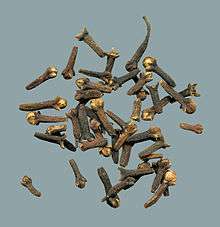Definify.com
Webster 1913 Edition
Clove
Clove
,Noun.
A cleft; a gap; a ravine; – rarely used except as part of a proper name;
as, Kaaterskill
. Clove
; Stone Clove
Clove
,Noun.
[OE.
clow
, fr. F. clou
nail, clou de girofle
a clove, lit. nail of clove, fr. L. clavus
nail, perh. akin to clavis
key, E. clavicle
. The clove was so called from its resemblance to a nail. So in D. kruidnagel
clove, lit. herb-nail
or spice-nail
. Cf. Cloy
.] A very pungent aromatic spice, the unexpanded flower bud of the clove tree (
Eugenia aromatica
syn. Caryophullus aromatica
), a native of the Molucca Isles. Clove camphor
. (Chem.)
See
– Eugenin
. Clove gillyflower
,
Clove pink
(Bot.)
, any fragrant self-colored carnation.
Clove
,Noun.
[AS.
clufe
an ear of corn, a clove of garlic; cf. cleófan
to split, E. cleave
.] 1.
(Bot.)
One of the small bulbs developed in the axils of the scales of a large bulb, as in the case of garlic.
Developing, in the axils of its skales, new bulbs, of what gardeners call
cloves
. Lindley.
2.
A weight. A clove of cheese is about eight pounds, of wool, about seven pounds.
[Prov. Eng.]
Halliwell.
Webster 1828 Edition
Clove
CLOVE
, pret. of cleave.CLOVE
,Noun.
CLOVE
, n.1.
A very pungent aromatic spice, the flower of the clove-tree, Caryophyllus, a native of the Molucca isles. The tree grows to the size of the laurel, and its bark resembles that of the olive. No verdure is seen under it. At the extremities of its branches are produced vast numbers of flowers, which are at first white, then green, and at last red and hard. These are called cloves.2.
[from cleave.] The parts into which garlic separates, when the outer skin is removed.3.
A certain weight; seven pounds of wool; eight pounds of cheese or butter.Definition 2026
clove
clove
English

Cloves (1).
Noun
clove (countable and uncountable, plural cloves)
- (uncountable, countable) A very pungent aromatic spice, the unexpanded flower bud of the clove tree.
- (countable) A clove tree, of the species Syzygium aromaticum (syn. Caryophyllus aromatica), native to the Moluccas (Indonesian islands), which produces the spice.
- (countable) An old English measure of weight, containing 7 pounds (3.2 kg), i.e. half a stone.
- 1843, The Penny Cyclopaedia of the Society for the Diffusion of Useful Knowledge p. 202.
- Seven pounds make a clove, 2 cloves a stone, 2 stone a tod 6 1/2 tods a wey, 2 weys a sack, 12 sacks a last. The 'Pathway' points out the etymology of the word cloves; it calls them ' claves or nails.' It is to be observed here that a sack is 13 tods, and a tod 28 pounds, so that the sack is 364 pounds.
- 1866, James Edwin Thorold Rogers, A History of Agriculture and Prices in England, Volume 1, p. 169:
- By a statute of 9 Hen. VI. it was ordained that the wey of cheese should contain 32 cloves of 7 lbs. each, i.e. 224 lbs., or 2 cwts.
- 1843, The Penny Cyclopaedia of the Society for the Diffusion of Useful Knowledge p. 202.
Derived terms
Translations
spice
|
|
measure
Etymology 2
From Middle English, from Old English clufu, cognate with cleofan (“to split”), hence with the verbal etymology hereafter
Noun
clove (plural cloves)
Translations
constitutive bulb of garlic
|
|
Etymology 3
Verb
clove
- simple past tense of cleave
Related terms
Etymology 4
Noun
clove (plural cloves)
- (geography) A narrow valley with steep sides, used in areas of North America first settled by the Dutch
Usage notes
- Mainly used in proper names, such as Kaaterskill Clove.